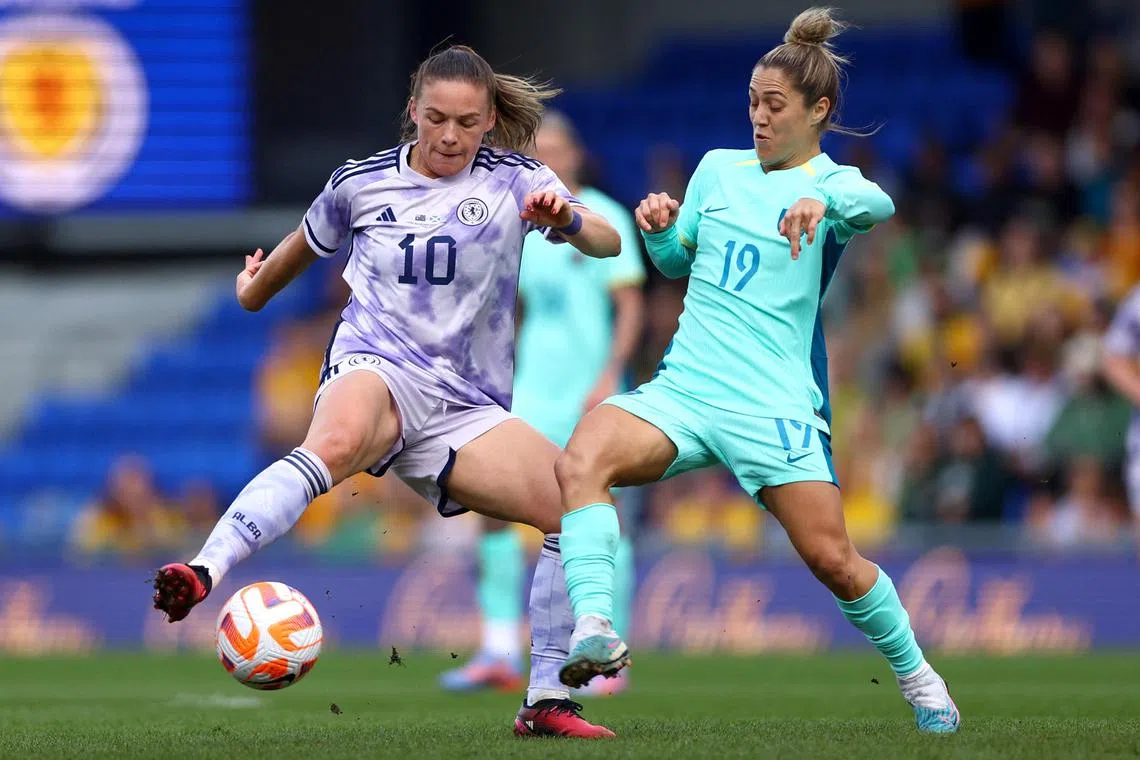Fifa predicts 2023 Women's World Cup will be 'watershed' moment
Sign up now: Get the biggest sports news in your inbox

Scotland's Kirsty Hanson (left) in action with Australia's Katrina Gorry during a friendly match.
Action Images via Reuters
SYDNEY – Fifa has predicted that the 2023 Women’s World Cup in Australia and New Zealand will be a “watershed” moment that propels the game to another level, with the target to eventually rival the men’s version.
Women’s football is already enjoying a surge in popularity in some countries, and the July 20-Aug 20 tournament looks set to spark further global interest.
Fifa’s chief women’s football officer Sarai Bareman told NewsCorp Australia in comments published on Tuesday – as organisers marked a 100-day countdown – that more than two billion viewers were expected to tune in, double the previous tournament in France.
Record attendance is also predicted, with 650,000 tickets already snapped up.
Bareman believes the event would be a major turning point and a driver for social change, creating role models for young girls and helping promote gender equality.
“People will be saying, ‘That was the watershed moment that changed everything and took the game to the next level’,” she said.
“And that’s in every aspect – commercially, participation, popularity and growth.
“I think people will really look back and choose the women’s World Cup in Australia and New Zealand as that watershed moment where the growth, which is already exponential, just took off to the absolute next level.”
Bareman, a New Zealand-born former Samoan international, added that the ultimate goal was to grow the tournament to rival the men’s and get females on equal footing in terms of pay.
“We know the men’s World Cup is the primary source of revenue for Fifa and football, and that generates in excess of US$5 billion (S$6.7 billion) per edition, and that’s a clear target for women’s football,” she said.
“We want to get to that level... we’re still in our infancy as a product.
“But we have to look at what’s happening in the men’s game as an inspiration and a target. For me, it’s got to be in the billions and we have to keep pushing.”
The tournament, which will take place in five Australian and four New Zealand cities, has been expanded from 24 to 32 teams for the first time.
It kicks off with New Zealand facing Norway in Auckland and Australia meeting Ireland in Sydney.
Hopeful the world No. 10 Matildas can have a deep run on home soil, Australia has boosted funding for elite women’s programmes in recent years but officials are still hoping to have better resources to handle an expected rise in grassroots participation.
“Currently, only 40 per cent of football facilities nationwide are classified as female-friendly,” Football Australia said.
“It is imperative that we invest in our 2,400-plus community clubs across the country to ensure they are adequately prepared for the expected surge in female participation, and participation in the sport more broadly.”
New Zealand is staging its third global sporting event in less than two years, having hosted the women’s Rugby World Cup and women’s Cricket World Cup in 2022.
Rugby World Cup organisers hailed record crowds as New Zealand’s Black Ferns swept to the title last November.
The Football Ferns, ranked world No. 25, are unlikely to emulate the rugby team’s success but New Zealand expects the event to give the local women’s game a major boost.
“I think it’s going to do wonders for women’s football in New Zealand,” said Wellington Phoenix player Chloe Knott.
“Hopefully, it generates a heap of support from young footballers and people who may never have been interested before.”
Despite the positivity and Bareman’s upbeat outlook, some broadcasters have reportedly made low-ball offers for rights to screen the event, a move slammed by Fifa president Gianni Infantino as “not acceptable”.
The concerns are around some games being played at night or the early hours of the morning in lucrative markets in Europe and the Americas.
Bareman told NewsCorp that broadcasters underbidding could miss out entirely.
“We do have to hold the line and make sure that, for the good of the next generations of female footballers, that they are given the opportunities afforded their male counterparts,” she said.
“We can only do that by ensuring its commercial value is recognised. It could be the case (some countries miss out).” AFP, REUTERS


